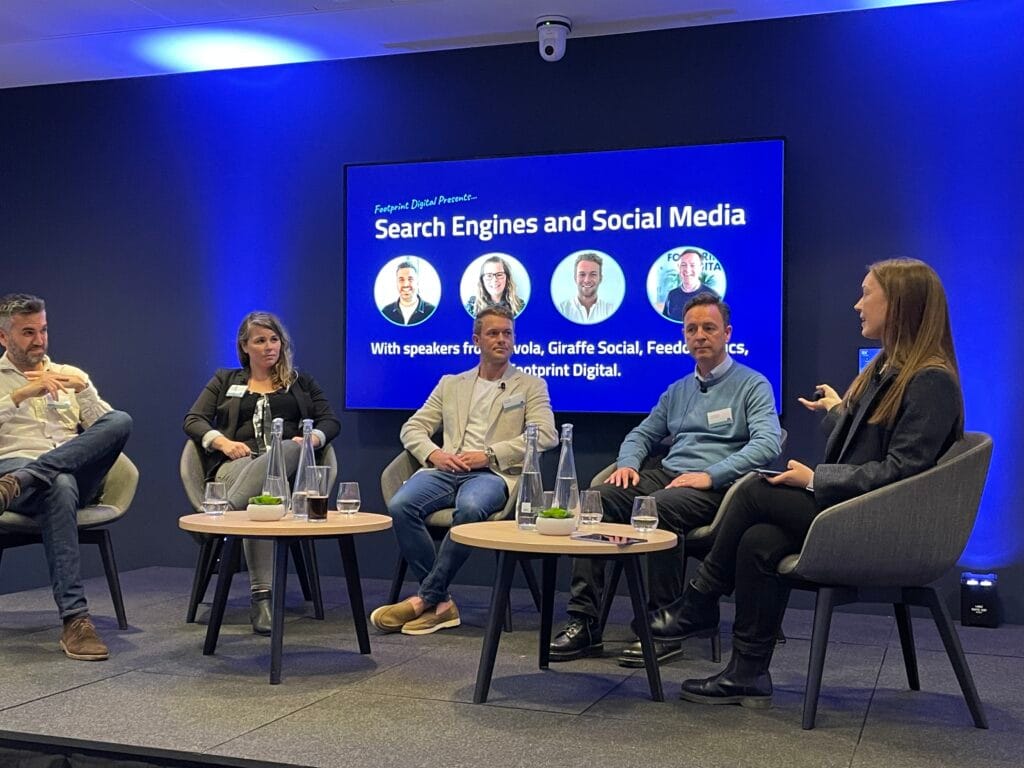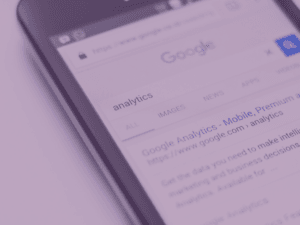
What does the future of social media and search marketing look like?
What role do emerging technologies like artificial intelligence and natural language processing play in shaping the future landscape?

Our final question to panelists Alex Jeater, Kate Webster, Tom Walker and Mick Scanlon looked at the future of search and social. In today’s rapidly evolving digital landscape, the future is poised for transformative changes, driven significantly by emerging technologies such as artificial intelligence (AI) and natural language processing (NLP).
However, the integration of AI in marketing raises important questions about maintaining authenticity and human touch, which are critical for consumer trust. Read below how our panel delved into these dynamics, exploring how AI can be leveraged effectively without compromising the unique insights and creativity that human input brings.
Tom: It’s a big question, and everyone’s going to be waiting for the word AI! The future is going to have some sort of AI component to it because it makes certain jobs seamless, it’s often automated which can help people to be more productive; however, in the space that I’m in with product feed management one of our unique selling points is not actually leaning so much on AI but actually having human input.
Over years of research we understand how consumers search on platforms which is different between a social platform and a search platform. We build feeds in a human way based on verticals and regions.
We do have AI tools that we’ve developed that help with more mundane tasks like categorisation and matching Google’s taxonomy which is crucial for marketers because that reduces cost per click. So if we can accurately help with that it has a positive impact for our clients’ ad spend.
The future of social platforms is really exciting. We’ve seen how TikTok video content has blown up, I think the next five years are going to show a massive shift. AI will be a big part of that but you have to be careful because AI is used so broadly today, is it actually solving a problem?
If you just develop AI tools to stay relevant you might be creating potential issues rather than solving them. If AI can be used in the correct way to streamline processes, become more efficient and actually benefit a client or a team then it’s useful.
Alex: Today, content creation using generative AI is terrible! It’s almost become a bit of a joke that you can use on your channels as an entertainment factor. That will obviously improve over the next five years or so, but there’s also a bit of a conundrum between using AI and people wanting authenticity from your content. It doesn’t work quite yet.
There’s a lot of low value brand awareness campaigns that you can run with AI currently but I think the biggest thing that we’re looking forward to is being able to do community management through AI tools. This would take a massive burden off of social media managers and community managers.
Longer term, we haven’t talked about social commerce yet. TikTok is making a massive play for it at the moment, it’s been hit and miss on places like Meta, but social commerce is having a huge impact on the way people shop and that will continue to change massively over the next five years.
Kate: When it comes to integration of AI with the software that we already use then that will save a lot of time. A lot of AI we use for inspiration and giving us somebody to debate with and create a spark of an idea.
Everyone nowadays is using Canva, and Canva uses a lot of AI. We’re seeing it now with paid on Meta and all the AI tools that are used to automatically and seamlessly optimise your ads depending on the placement so AI can do all of the leg work and save time.
But there’s that dichotomy between authenticity and AI and what is that going to do to the trust factor that is so critical for influencing behaviour when it comes to marketing?
Mick: I think that’s the battleground that we’re seeing emerge, the genie is out of the bottle and we can’t put it back in, there are a lot of time saving efficiency creating AI tools for marketers on Meta and Google now.
I was creating some shopping ads for a client this week and a new feature popped up asking me if I wanted it to do large sections of the legwork for me. We’ve talked to copywriters and said if this gets you beyond writer’s block and into the swing of things more quickly, that’s a great thing for us and for our clients. AI is not taking over but we do need to use it to our advantage.
We’ve got to the point now where we all agree that social media is where people are going to find authenticity and communities to align with, but if that’s now going to have AI features plugged into it more and more, then suddenly the video that you’re seeing might not be what it seems to be, and that’s the battle.
As marketers we can jump in headfirst and think that AI is a great time and money saving tool, but actually we could start putting content out there that people don’t trust because they know it’s not real, and that turns them off and erodes their relationship with our brand.
Tom: That’s the fine line between time saving, and having an AI tool created for a specific use case, rather than general creativity. The one AI tool that we have at Feedonomics is a categorisation tool, so it takes every product in a catalogue and categorises it according to the taxonomy of the channel that you’re sending it to, so for example Google’s taxonomy for Google shopping.
We knew that for the likes of TikTok, Snapchat, Pinterest and Meta that if we had about twenty million products a week that we had to filter through and categorise for their different systems that would take a long time for a team of people to go through that entire catalogue but we can do that in seconds now with AI.
This tool maximises efficiency, there’s no creativity involved, it’s a mundane job that saves somebody having to do it, so they can do something more creative.







